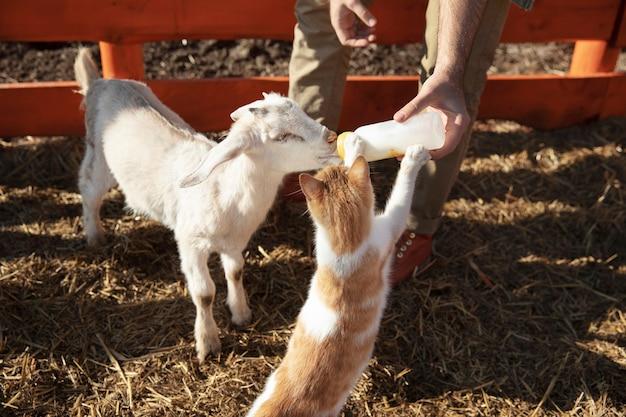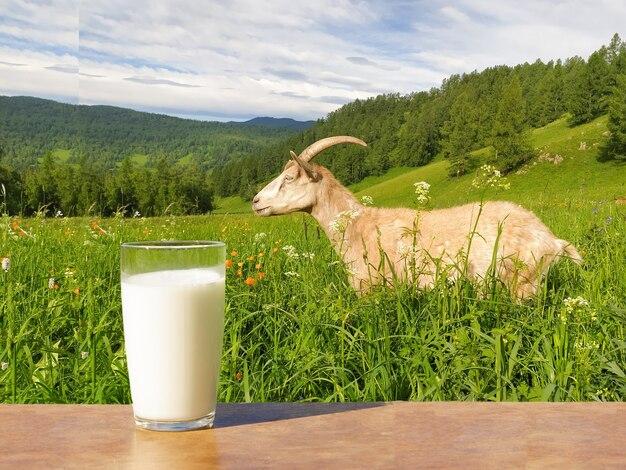Welcome to our informative blog post on how long goat milk can safely sit out at room temperature. If you love goat milk and want to know how to keep it fresh and tasty, you’ve come to the right place. We’ll address common questions like whether goat milk needs to be refrigerated, how long it can be left out, and what happens if it spoils.
As people become more interested in natural and alternative dairy products, goat milk has gained popularity for its unique taste and potential health benefits. But understanding the best practices for handling and storing goat milk is essential to ensure its safety and quality. So, let’s dive into the fascinating world of goat milk and find out all the details you need to know!
Stay tuned for answers to questions like whether raw goat milk is safe to consume, how to store goat milk after milking, and how to recognize if goat milk has gone bad. We’ll also discuss the benefits of drinking goat milk, the pasteurization process, and how to pasteurize goat milk at home. So, grab a glass of goat milk and let’s get started!
How Long Can Goat Milk Sit Out
Goat milk, the creamy and delicious alternative to cow’s milk, is gaining popularity among health-conscious individuals. But what happens when you accidentally leave a carton of goat milk sitting out on the counter? How long can goat milk sit out before it goes bad? Let’s dive into this udderly fascinating topic and find out!
The “Danger Zone” Temperature
Just like cow’s milk, goat milk is highly perishable and sensitive to temperature changes. When left at room temperature (around 70°F or 21°C), goat milk enters what food safety experts call the “danger zone.”
Bacteria Beware
Within the danger zone temperature range, bacteria can multiply rapidly. This bacterial growth can lead to the dreaded spoiling of your goat milk. Nobody wants a glass of milk that tastes like a science experiment gone wrong!
Freshly Milked vs. Store-Bought
The length of time goat milk can sit out without spoiling depends on whether it is freshly milked or store-bought. Freshly milked goat milk is not pasteurized, meaning it still contains beneficial and potentially harmful bacteria.
Freshly Milked Goat Milk
If you’re lucky enough to have access to freshly milked goat milk, you must handle it with care. Ideally, freshly milked goat milk should be consumed immediately. If not, it is recommended to refrigerate it within two hours of milking.
Store-Bought Goat Milk
Store-bought goat milk is usually pasteurized, a process that kills most of the bacteria and extends the shelf life. However, once you open the carton, refrigeration becomes imperative for maintaining freshness.
The Cold Truth: Refrigeration
To keep your goat milk fresh and safe to consume, always refrigerate it. For both freshly milked and store-bought goat milk, make sure to place it in the refrigerator at a temperature of around 40°F (4°C) or below.
The Shelf Life Sneak Peek
When properly refrigerated, goat milk can maintain its quality and safety for approximately seven to ten days beyond the printed expiration date. This means that even if you forget to drink it within the recommended time frame, you may still have a little extra grace period.
Trust Your Senses
While the printed expiration date serves as a general guideline, it’s essential to trust your senses when it comes to determining if your goat milk has gone bad. If you notice an off smell, strange texture, or sour taste, it’s best to err on the side of caution and discard it.
The Freezing Solution
If you can’t consume your goat milk within the recommended time frame, freezing it is an option. Freezing can extend the shelf life of goat milk for up to three months. However, keep in mind that the texture may change after thawing, so it’s better to freeze small portions rather than the whole carton.
Goat milk, while delicious and nutritious, requires proper storage to maintain its freshness. Remember to refrigerate your goat milk promptly and consume it within the recommended time frame. If you find yourself unable to finish it before it goes bad, consider freezing it in small portions. By following these guidelines, you can ensure your goat milk stays udderly delightful until the very last drop!
Frequently Asked Questions About Goat Milk
Does Goat Milk Need to Be Refrigerated
Goat milk, like any other type of milk, should be refrigerated to maintain its freshness and safety. While goats are adorable creatures, leaving their milk out at room temperature for extended periods is not recommended. To keep your goat milk deliciously creamy and ready for consumption, store it in a refrigerator set at a temperature between 32°F and 40°F (0°C and 4°C).
Is Raw Goat Milk Safe
Raw goat milk can be safe for consumption, but it comes with some risks. While many people enjoy the taste and potential health benefits of raw milk, it’s important to note that unpasteurized milk may carry harmful bacteria like Salmonella and E. coli. If you choose to drink raw goat milk, be sure to obtain it from a reliable and trustworthy source to minimize the chances of any contamination.
Can I Leave Milk Out for 4 Hours
Leaving milk out at room temperature for four hours or longer is not recommended. Bacteria thrive in warm environments, and milk provides an excellent breeding ground. To ensure the milk remains safe to drink, it’s best to refrigerate it within two hours of being left at room temperature. Remember, keeping your goat milk chilled will help maintain its freshness and taste.
How Long Is Unpasteurized Goat Milk Good For
Unpasteurized goat milk typically has a shorter shelf life compared to pasteurized milk. It can last for about four to seven days when stored properly in the refrigerator. However, always check for any signs of spoilage, such as a sour odor, unusual consistency, or off-flavors, before consuming.
Why Is Goat Milk Chunky
If your goat milk becomes chunky, don’t panic. It’s not a sign that the goats have been secretly experimenting with cheese-making! Chunkiness in goat milk can occur due to a natural separation process called creaming. The milk fat rises to the top, creating solid, clumpy particles. To restore its smoothness, give the milk a gentle swirl or stir before consuming.
What Do You Do With Goat Milk After Milking
After milking your lovely goats, you have a range of options for using their precious milk. From enjoying it fresh to creating delicious cheeses, yogurts, ice creams, and so much more, the possibilities are endless. Experiment with recipes, share it with family and friends, or even consider selling it if you have an abundance. Just remember to follow proper storage and handling guidelines to ensure the milk remains safe and tasty.
What Happens If You Drink Milk Left Out Overnight
If you leave milk out overnight, it’s best to resist the temptation to drink it. The danger lies in the rapid growth of bacteria, which can cause foodborne illnesses. Room temperature provides an ideal environment for bacteria to multiply, potentially leading to an upset stomach, diarrhea, or even more severe health issues. When in doubt, it’s better to be safe than sorry and discard milk that has been left out for an extended period.
How Long Can Unopened Milk Last Out of the Fridge
Unopened goat milk can last for several months when stored at room temperature. However, keep in mind that the milk’s quality may deteriorate over time, affecting its taste and texture. For best results, refrigerate unopened milk to extend its shelf life and maintain its freshness.
Can You Warm Goat’s Milk
Yes, indeed! Goat’s milk can be gently warmed. Whether you want to enjoy a comforting cup of warm milk or use it in recipes, warming goat’s milk can enhance its taste and make it more pleasant to consume. But be careful not to overheat it. Use gentle heat on a stovetop or microwave to warm the milk, ensuring it doesn’t reach boiling temperatures.
How Long Can Milk Be Left Out at Room Temperature Before It Spoils
To prevent milk from spoiling, it should not be left at room temperature for longer than two hours. Bacteria can multiply rapidly in a warm environment, leading to potential foodborne illnesses. Keep your milk fresh by promptly refrigerating it and following proper handling and storage practices.
How Long Does It Take for Goat Milk to Spoil
The time it takes for goat milk to spoil depends on various factors, including storage conditions and whether it has been pasteurized. Typically, when properly refrigerated, goat milk can last for about one week before showing signs of spoilage. However, always trust your senses and discard any milk that has an unusual odor, strange consistency, or off-flavors.
How Do You Store Goat Milk
Proper storage is key to maintaining the freshness and quality of your goat milk. Store it in a clean, sealed container, such as a glass jar or plastic bottle, in the refrigerator. Aim to keep the temperature between 32°F and 40°F (0°C and 4°C) to inhibit bacterial growth. Avoid storing goat milk on the door of the refrigerator, as temperature fluctuations can occur when the door is opened frequently.
Can I Freeze Goat Milk
Absolutely! Freezing goat milk is an excellent option if you have an excess supply or want to extend its shelf life. Make sure to use freezer-safe containers, leaving some headspace to accommodate expansion during freezing. When you’re ready to use the frozen milk, thaw it in the refrigerator overnight and give it a gentle shake before enjoying. However, keep in mind that freezing may alter the texture of the milk slightly.
What Are the Benefits of Drinking Goat Milk
Goat milk offers a range of potential benefits. It contains essential nutrients like calcium, protein, vitamins, and minerals that are vital for maintaining good health. Additionally, some people find that the proteins in goat milk are easier to digest than those in cow’s milk, making it a suitable alternative for individuals with lactose intolerance or dairy sensitivities. However, as with any dietary changes, it’s best to consult with a healthcare professional for personalized advice.
Do You Have to Pasteurize Goat Milk
Pasteurization is not a requirement for goat milk consumption, but it’s recommended for safety reasons. Pasteurization involves heating the milk to kill harmful bacteria, reducing the risk of foodborne illnesses. Although raw goat milk enthusiasts believe in the potential health benefits of drinking raw milk, it’s crucial to understand the associated risks and make an informed decision based on your personal health and circumstances.
How Do You Pasteurize Goat Milk
Pasteurizing goat milk can be done by heating it to a specific temperature and then rapidly cooling it. The exact process can vary, but a common method is to heat the milk to 145°F (63°C) and maintain that temperature for around 30 minutes. Afterward, the milk should be quickly cooled to below 50°F (10°C). Pasteurization helps kill harmful bacteria, making the milk safer for consumption.
How Can You Tell If Goat Milk Is Bad
To determine if goat milk has gone bad, rely on your senses. When milk spoils, it typically develops a sour or rancid odor. Check for any changes in color, consistency, or taste. If the milk appears clumpy, has an off-putting texture, or tastes off, it’s best to dispose of it. Trust your instincts, and never take chances with spoiled milk.
Now that all your burning questions about goat milk have been answered, go forth and enjoy this creamy delight with peace of mind. Remember to handle and store goat milk properly to savor its freshness and take advantage of its potential health benefits. Whether you prefer it straight from the refrigerator, warmed in a comforting mug, or used as a versatile ingredient, goat milk is sure to bring joy to your taste buds. Cheers to the wonders of goat milk!

